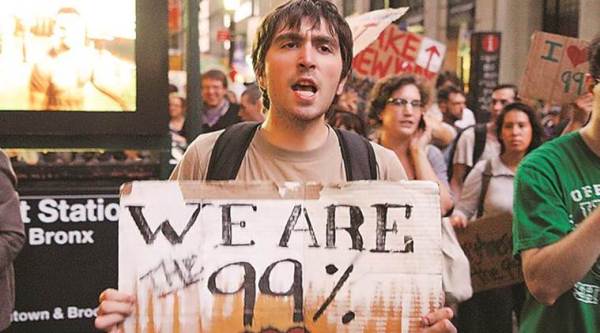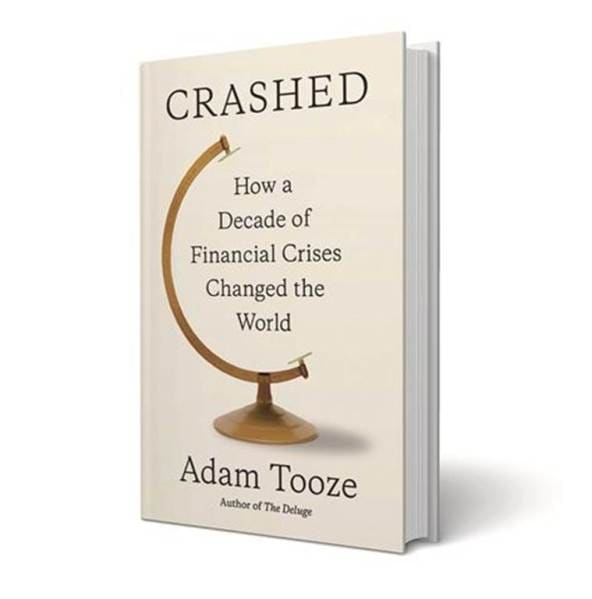It really was the economy, stupid!
A deep dive into the 2008 global financial crisis, this book brings into sharp focus the international interconnections that sank the world economy

A man is holding a sign that says, We Are The 99 per cent at an Occupy Wall Street protest; (Wikimedia Commons)
How should one think of the global financial crisis of 2008, a decade after the event? What were its drivers and repercussions? Adam Tooze’s Crashed is a detailed but riveting and brilliant account of the crisis. It is a vital book to understand our times and measures up to the enormity of its subject. This is a genuinely global history of the crisis. More than any other history, it brings out how deeply interconnected the world had become, through the mechanism of finance, by 2008, and how complicated those sinews of dependency were. Second, it is an integrated financial, political and strategic history of the world. In Tooze’s telling, this crisis is not just a product of greedy bankers running a Ponzi scheme on the rest of us; it has its deep roots in the political economy and strategic thinking of several countries, all of which came to a head in 2008.
Tooze represents the crisis as a product of many conjunctures. Centrist parties all over the world, but particularly the Democrats in the US, had become the parties of finance. The wholesale destruction of safeguards in the banking system erected in the aftermath of World War II. It paved the way for reckless banking. This was the triumph of Wall Street-driven ideological thinking that exercised an iron grip over global establishments through dense networks of power and influence. Strangely enough, Tooze does not dwell deeply enough on how these parties of finance became so dominant. Was it simply a cognitive shift? Was this simply a consequence of the internal incentives for bankers? Or was the expansion of credit, particularly to the housing market, really a way of masking underlying inequalities and stagnation that has deeper sources?
There were also cognitive dissonances of all kinds. The obsession of the Democrats (as evidenced in the so-called Hamilton project), was with global imbalances. These posed a strategic threat to the US. The dominant fear in the years before the crisis was that the Chinese would pull the plug on the system propping up the US economy. But in the list of risks, the implosion of the banking system figured nowhere. When economists like Raghuram Rajan pointed out those risks in that now-famous Jackson Hole conference, they were dismissed as Luddites. Possibly malign foreign governments were considered a bigger risk than reckless bankers. But the real blind spot was in Europe. European ideological self-presentation was besotted with the myth that Europe was not America. But in some ways it was even worse. It’s banking practices had imbibed some the reckless propensities of American banking. While the public focussed on trade, everyone seemed to forget the fact that European banks had built up enormous dollar liabilities through finance. And most worryingly, while the dollar was backstopped by the political might and institutions of the US, Europe was hobbled by a mismatch between its financial and political architecture. So the Euro-Atlantic system really had become one system, though no one was owning up to it. One measure of this is the fact that the US Fed had to effectively also become the central banker for Europe when the crisis hit.
In America, Tooze’s political villains are finance-besotted Democrats and war-mongering Republicans who consistently wrecked American public finance. In Europe, the biggest villain in this telling, perhaps a little unfairly, is Angela Merkel. Europe’s political crisis was deeper. In 2005, voters in Holland and France had rejected deeper European integration. As a result, Europe reverted to a form inter-govermentalism that could not match up to the deep interconnectedness of the European economy. Gordon Brown comes off quite well in this account, one of the few who seems to have understood the nature of the crisis; the French are in various forms of grandstanding and denial, while the Germans more concerned with their wellbeing than that of Europe. Germany refused to do the heavy lifting by stimulating the economy in ways that could have helped the Eurozone, and even when it acted, it did so to protect bankers, not to provide relief to ordinary citizens from Greece to Spain.
Meanwhile, the Russians turned out to be in a strange way more prescient than the Europeans. The one thing Russians managed to avoid during the crisis was a shortage of dollars. It is almost a cautionary tale, in that strategic rivalry can also lead to a sharper eye for economic vulnerability. The chapter on China describes the logic of Chinese thinking and its internal tensions with a great deal of clarity.
Tooze’s fluent account captures that warlike headiness of decision making under uncertainty, and high existential stakes. In retrospect, Tooze seems to think that not rescuing Lehmann was a mistake, which perhaps magnified the impact of the crisis. And once the crisis hit, the world was turned upside down. Banks received unprecedented government support, and the range of instruments devised to put banks back on their feet were staggeringly imaginative. Stimulus packages came to the fore with a vengeance, none more spectacular that China’s. The Obama administration did enough to put the economy on an even keel. But it was quite clear that the US still had ideological resistance to bigger stimulus packages. Or perhaps more importantly, packaging them in a way that the public recognised them as another New Deal. But in the end, the public saw only that bankers were bailed out while homeowners were not, and the same story was repeated on a larger scale in Greece. Centrist parties paid the price: they were too cosy with Wall Street and too timid about public finance to get credit for fixing the economy. This set up the conditions for a populist backlash. But the cautionary tale is that the conditions that produced the crisis are back again, with one difference: nationalism, not global cooperation, is now dominant.
Pratap Bhanu Mehta is vice-chancellor of Ashoka University










.png)











 Crashed: How a Decade of Financial Crises Changed the World Adam Tooze Viking 720 pages
Crashed: How a Decade of Financial Crises Changed the World Adam Tooze Viking 720 pages
No hay comentarios:
Publicar un comentario